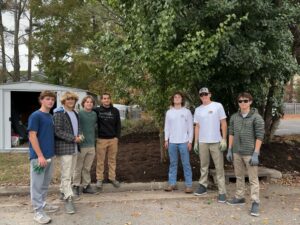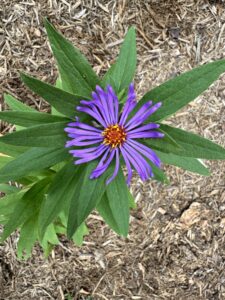
Virginia Beach Public School Environmental Studies Program senior Nick Basciano was native asters’ answer to Johnny Appleseed the other day.
Nick spent a good part of the morning at LRNow separating fluffy aster seed heads out from a garbage bag full of stems and garden debris so the seeds could be used in LRNow habitat restoration projects.
Nick’s fleece jacket was covered in aster seeds. His jacket also was spotted in rich mulch from other gardening projects the students were carrying out that day.
He said he felt like his fleece with the mulch was a little like a suitable growing environment and before too long, asters were going to be spouting from his jacket!
Helping to spread seeds of pretty fall flowering asters around the Beach is just one of many benefits the students have brought to eco-friendly gardens here as part of their environmental studies curriculum.
Not long ago a group of seniors gathered the garbage bag full of fluffy aster seed heads when they worked to thin and clear native plants at Westminster-Canterbury on Chesapeake Bay. The community is a LRNow Pearl Home, Pearl Faith Community and Pearl Neighborhood.
As the students helped to put Westminster Canterbury’s gardens to rest for the winter, they learned about the community’s many native plants and the benefits natives bring to wildlife and the environment. Some of Westminster’s native plant gardeners, LRNow’s Restoration Coordinator Vince Bowhers and LRNow’s Volunteer Coordinator Kathryn Trainor were on hand as mentors.

A couple of weeks after their stint at the retirement community, the hard working weeders and thinners arrived at LRNow’s yard. There, Nick and others not only separated seeds from the garden debris, but they also went to work clearing a big bed of ivy from an area by the shed. In the process they help save some native trees covered in ivy vines. They also hauled wheelbarrow loads of mulch to finish off the area under the trees.
The next project is to plant the aster seeds in pots. In spring the seedlings will be spread among LRNow’s habitat restoration projects, Vince said.
Pretty little asters, of which there are several varieties, mostly blue and some, white, are nature’s answer to traditional non-native chrysanthemums. They brighten the landscape in fall and most importantly provide nectar for late season butterflies and other insects.

Maybe next spring you will see new asters in LRNow’s gardens, spread by Nick, aka Johnny Appleseed, and his fleece jacket as he walked around!
For sure, asters will be growing in LRNow’s habitat restoration sites and other gardens at the beach will be thriving too, thanks to the hard work of students from the Environmental Studies Program!